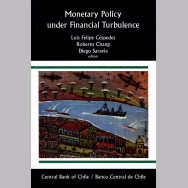Volumen 16: Monetary Policy under Financial Turbulence
Publicaciones
Volumen 16: Monetary Policy under Financial Turbulence
Descripción
The financial crisis that started in 2007 brought the global economy to the brink, and in many respects it is still unfolding, especially in Europe. While a fierce debate continues on how to understand and deal with the crisis, a consensus is emerging with regard to the originating shocks, the mechanisms that amplified those shocks, and official policy responses, especially from central banks. The new consensus assigns a substantially bigger role to financial imperfections and institutions than was previously assumed, to the point that one can safely say that for the next several years, research on macroeconomic policy will be dominated by the interaction between financial frictions, the financial system, and aggregate fluctuations.
This volume gathers twelve contributions by distinguished scholars analyzing the causes of the crisis, the role of financial instruments and financial imperfections in its propagation, and the role that policymakers could play through the use of monetary and fiscal policies. These studies expand on theoretical and empirical issues surrounding the new consensus and identify significant lessons for macroeconomic and financial policy.
Editor: Luis Felipe Céspedes; Roberto Chang; Diego Saravia.
Comentarios
"The current crisis has opened a Pandora's box of monetary and fiscal policy issues. Policies that would have been dismissed as ill-advised a few years ago, are taking center stage, led by the hand of reputable academics and institutions like the IMF. This is intellectually very exciting but it may launch an era of dangerous permissiveness. This volume is the right antidote. Without trivializing or losing sight of the new challenges, it offers a variety of perspectives that help to bring analytical rigor to the discussion, and provide valuable views about relevant issues. Contributors are top-flight academics and policymakers. AII of which makes this volume an indispensable tool for anyone interested in understanding the challenges posed by the current crisis, and ways to prevent its recurrence."
Guillermo Calvo, Columbia University
"These proceedings of the premier central bank research conference in Latin America bring together an important set of papers that further our understanding of the financial crisis. Going beyond merely surveying the theoretical and empirical origins of the calamity that began in summer 2007, the contributions of some of today's best macroeconomists collected here help us to understand how it is that we should think about reforming financial regulation and monetary policy so as to reduce the probability and mitígate the severity of the next crisis."
Stephen G. Cecchetti, Bank for International Settlements
"In this volume world-class economists provide preliminary answers to an embarrassing question: How did a housing bust in the United States, initially estimated to be a manageable few hundred billion dollars, turn into a financial crisis that generated trillions of dollars of losses all over the world and nearly a great depression? The papers address the origins of the crisis, financial market failures and other factors that amplified the crisis and spread it around the world, and finally the policy implications. Formal economic reasoning is often most interesting and important when used to confront new problems. This collection of original papers is a wonderful example."
Michael P. Dooley, University of California, Santa Cruz
Volumen 16: Monetary Policy under Financial Turbulence
Recuadros y gráficos

